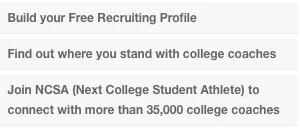Bigger Changes in Store for the NCAA Next Year
In January, the Division I Board of Directors will look at 27 proposals from the Rules Working Group. Many of those proposals will be some of the biggest changes ever contemplated to the NCAA manual. While they are likely to sail through the Board of Directors, there will be a major battle over a few during the override process that will follow, just like with the $2,000 stipend and multiyear scholarships.
But many of those proposals can be seen as low-hanging fruit. Sure, some have the potential for great impact, like allowing noncoaching staff to call prospects and evaluate recruiting film. Others raise huge questions about what they actually do, like the proposal to make turn prospects into student-athletes when they sign an scholarship offer or National Letter of Intent. But by and large, the proposals are hitting pain points that everyone can agree on, like having to monitor phone calls or confusing amateur exceptions for Olympic athletes.
The Rules Working Group and the Board of Directors Will Attack a More Controversial Set of Topics:
• Coaching categories and non coaching personnel
• Agents and advisors
• Promotional activities
• Recruiting calendars/models for all sports
• Academic misconduct/fraud
• Transfer requirements
• Progress-toward-degree requirement modifications
• Meals for student-athletes
• Number of contests/length of season in each sport
Each of these has the potential to be hotly debated and for some the NCAA has given little hint over the last few years which way things may go. Some of these are no brainers though. Defining and limiting the number of people that work with a sports program outside of the coaches has been a project now into its third year. Allowing schools more discretion to feed student-athletes is a pretty sure bet. And the length of seasons and number of games will be frozen, if not reduced across the board.
Others we can take a logical guess. As the North Carolina academic scandal continues to twist and turn, expect the NCAA to try and gain additional authority to investigate and punish academic fraud beyond plagiarism, improper assistance, and cheating. Permission to contact and releases may be removed from transferring, but so might some of the exceptions and waivers that allow athletes to play immediately. Continuing eligibility requirements are another where the direction is not entirely clear, but one possibility is to reduce the ways that a student ahead of schedule on the gradation track can still renders him/herself ineligible.
And some of these topics have major questions to answer. Sports without recruiting calendars will probably get them, but will they trend toward wide open calendars with lots of contact and few dead periods? How will the ongoing O’Bannon case affect changes to promotional activities involving, which could end up restricted further or greatly deregulated. The agent/adviser distinction is probably on borrowed time, but which will win out? And will that branch out into other amateurism topics like draft entry and professional tryouts?
At first, the $2,000 stipend was seen as a sort of “last straw” for the haves, something that would either break apart Division I or create a clearer distinction of classes with in it. So far, that has not happened. Undoubtedly the current round of proposals will be cast the same way, even though many of them will have widespread if not universal support or will not as big an impact as anticipated.
2013 is When the Real Fight Begins
The direction of the changes is not clear and harder choices need to be made. Some of the ideas will be popular with the little guy, some will probably make even some of the haves feel under pressure. Some areas will be deregulated and others will be more closely watched by the NCAA. All of this will raise the stakes of this round of proposals. If the big tent of Division I falls apart and the largest schools leave the NCAA, what happens over the next year will likely be a major landmark when asking why.
What rule changes do you want to see? Let us know in the comments below or on Twitter, Facebook or Google+!


